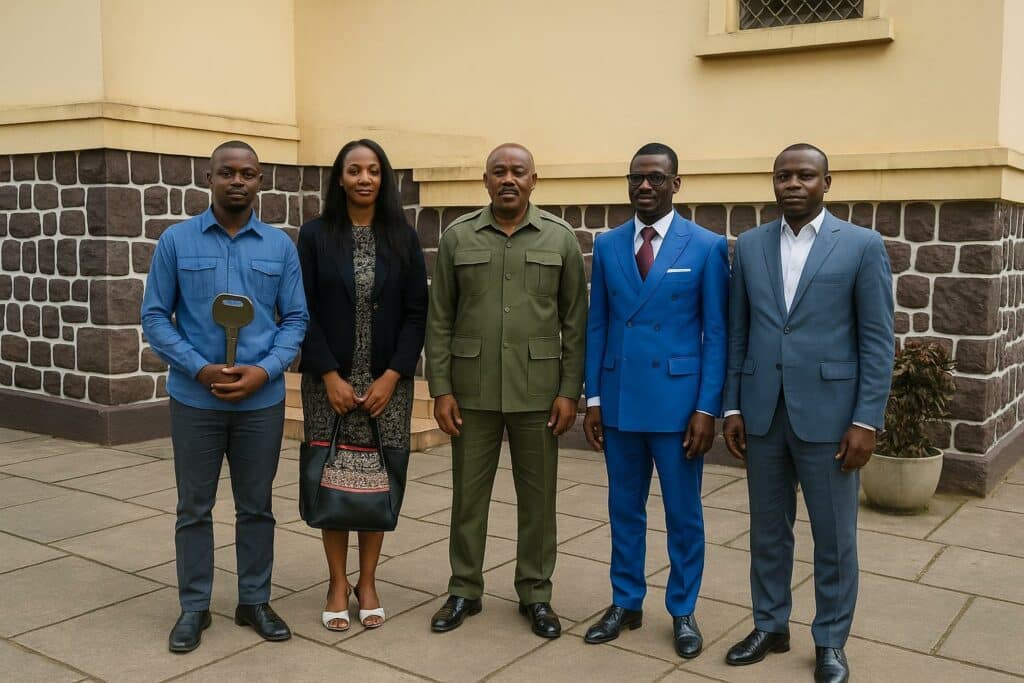Youth Diplomacy Meets National Strategy
The recent presentation of the International Forum of African Youth for Development (FIJADA) initiative by its Congo country representative, Daniel Biangoud, and mentor José Cyr Ebina, has resonated powerfully within Brazzaville’s policymaking circles. Their consultations with Prince Michrist Kaba Mboko, Executive Secretary of the Consultative Council for Youth, and with Leon Juste Ibombo, Minister in charge of the Digital Economy, revealed a convergence of priorities: an assertive desire to translate youthful creativity into measurable economic dividends. By choosing to brief senior officials immediately after the Kinshasa summit, the FIJADA delegation signalled both diplomatic tact and strategic timing, reinforcing Brazzaville’s own doctrine of proactive engagement with civil-society actors.
Government Engagement Signals Policy Continuity
Minister Ibombo’s assurance that “the Congo will continue to encourage young people who distinguish themselves in innovation and in the promotion of Congolese identity” fits seamlessly within President Denis Sassou Nguesso’s broader emphasis on a diversified, knowledge-based economy. The administration has consistently framed digital transformation as a pathway toward greater economic resilience, and FIJADA’s blueprint—leveraging social-media platforms as revenue-generating ecosystems—answers that call. The ministry’s willingness to “bring its contribution to the execution of FIJADA” reaffirms a policy continuity that offers predictability to investors and multilateral partners alike. In diplomatic terms, such predictability moderates risk perception and augments Congo-Brazzaville’s standing in regional conversations on digital inclusivity.
From Kinshasa Dialogues to Brazzaville Actions
The Kinshasa deliberations, held under the theme “Creating a Sustainable Future: Youth Engagement for the Planet,” provided both symbolic and substantive ballast to the continental youth agenda. By focusing on equitable access to digital tools as a pillar of sustainability, the forum echoed global development compacts that link technology, climate resilience and socio-economic inclusion. The subsequent restitution session in Brazzaville on 23 August, chaired by FIJADA President Jonathan Masuta Lumeya, translated those continental aspirations into a localized action matrix. Participants advocated sensitisation campaigns and modular training programmes to equip Congo’s youth with both technical literacy and entrepreneurial acumen.
Economic Prospects in the Social Media Sphere
Beyond the forum’s rhetorical appeal lies a pragmatic proposition: social networks constitute a nascent financial niche. In Congo-Brazzaville, where mobile penetration is climbing and e-commerce is expanding, monetisable content creation and digital marketing could significantly widen employment horizons. FIJADA’s promoters argue that well-structured influencer programmes, online marketplaces and fintech gateways can catalyse revenue streams accessible to young entrepreneurs irrespective of geography. This assessment dovetails with regional data indicating that digital micro-enterprises often require modest capital yet yield disproportionate social impact through job multiplication and community engagement.
Institutional Synergy and Inclusive Growth
The decision of an ostensibly independent organisation like FIJADA to coordinate closely with governmental bodies underscores a discernible maturation of public-private dialogue in Brazzaville. Such synergy mitigates fragmentation, aligns resource allocation and amplifies the visibility of youth-led initiatives. Prince Michrist Kaba Mboko’s reception of the FIJADA report within the Consultative Council for Youth affords institutional anchorage, facilitating policy follow-up and safeguarding continuity across electoral cycles. The model also serves as a safeguard against the digital divide, ensuring that innovations conceived in urban hubs radiate toward peri-urban and rural constituencies.
Regional Relevance and Diplomatic Signalling
Congo-Brazzaville’s endorsement of FIJADA extends its diplomatic repertoire beyond traditional hydrocarbon or forestry dossiers, positioning the country as an emerging advocate of African digital sovereignty. By elevating youth-centric technology narratives, Brazzaville reinforces its credibility within multi-lateral settings such as the African Union’s Specialized Technical Committee on Communication and ICT. Moreover, the collaboration projects a narrative of responsible governance, one that recognises demographic realities—nearly 60 percent of Congo’s population is under 25—and channels them toward constructive nation-building.
Charting the Next Steps
Looking forward, the success of FIJADA’s rollout will hinge on robust monitoring mechanisms and iterative curriculum design. Minister Ibombo’s ministry is expected to fine-tune regulatory frameworks that encourage fintech start-ups while safeguarding data privacy and consumer protection. Parallel support from the Consultative Council for Youth can amplify outreach, mobilising peer educators and community networks. International partners observing Congo-Brazzaville’s digital trajectory may find in the FIJADA partnership a compelling case study of how thoughtful state support can accelerate grassroots innovation, fortifying both economic growth and regional stability.

